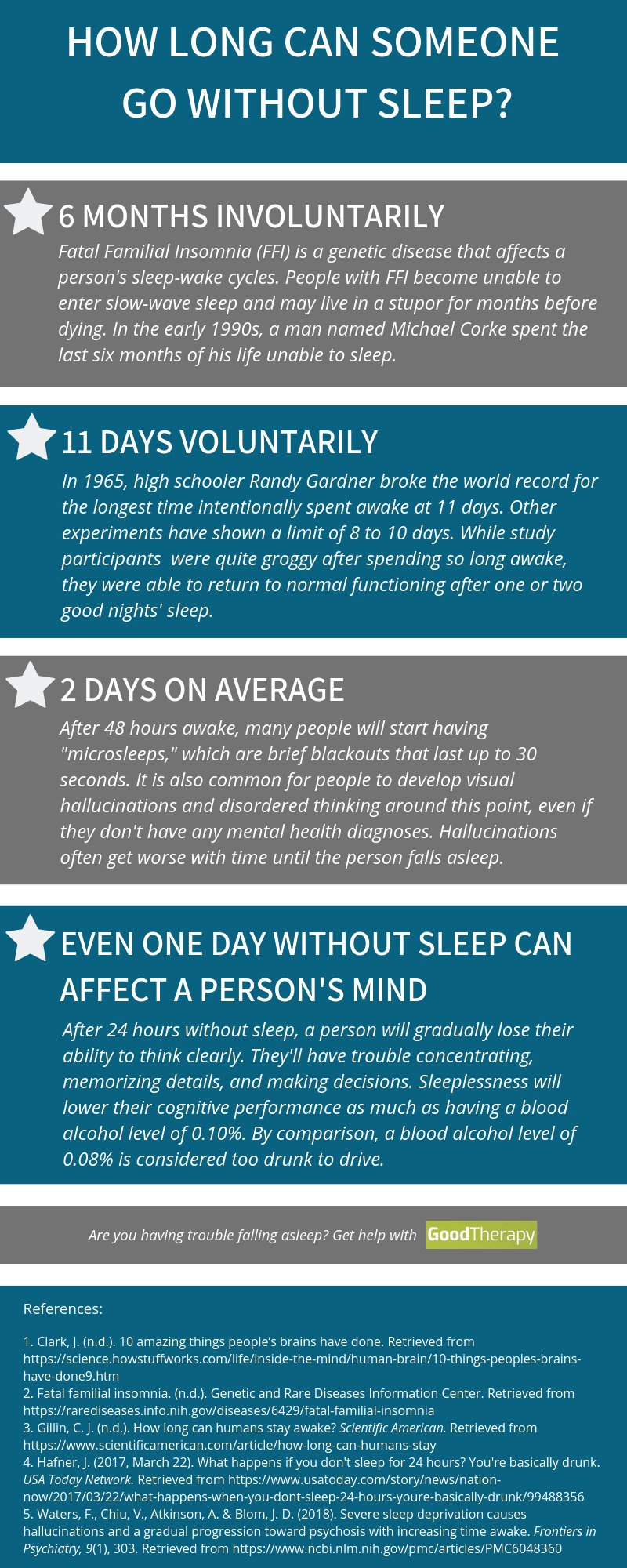Infographic Text: How Long Can Someone Go Without Sleep?
6 MONTHS INVOLUNTARILY
Fatal Familial Insomnia (FFI) is a genetic disease that affects a person’s sleep-wake cycles. People with FFI become unable to enter slow-wave sleep and may live in a stupor for months before dying. In the early 1990s, a man named Michael Corke spent the last six months of his life unable to sleep.
11 DAYS VOLUNTARILY
In 1965, high schooler Randy Gardner broke the world record for the longest time intentionally spent awake at 11 days. Other experiments have shown a limit of 8 to 10 days. While study participants were quite groggy after spending so long awake, they were able to return to normal functioning after one or two good nights’ sleep.
2 DAYS ON AVERAGE
After 48 hours awake, many people will start having “microsleeps,” which are brief blackouts that last up to 30 seconds. It is also common for people to develop visual hallucinations and disordered thinking around this point, even if they don’t have any mental health diagnoses. Hallucinations often get worse with time until the person falls asleep.
EVEN ONE DAY WITHOUT SLEEP CAN AFFECT A PERSON’S MIND
After 24 hours without sleep, a person will gradually lose their ability to think clearly. They’ll have trouble concentrating, memorizing details, and making decisions. Sleeplessness will lower their cognitive performance as much as having a blood alcohol level of 0.10%. By comparison, a blood alcohol level of 0.08% is considered too drunk to drive.
References:
- Clark, J. (n.d.). 10 amazing things people’s brains have done. Retrieved from https://science.howstuffworks.com/life/inside-the-mind/human-brain/10-things-peoples-brains-have-done9.htm
- Fatal familial insomnia. (n.d.). Genetic and Rare Diseases Information Center. Retrieved from https://rarediseases.info.nih.gov/diseases/6429/fatal-familial-insomnia
- Gillin, C. J. (n.d.). How long can humans stay awake? Scientific American. Retrieved from https://www.scientificamerican.com/article/how-long-can-humans-stay
- Hafner, J. (2017, March 22). What happens if you don’t sleep for 24 hours? You’re basically drunk. USA Today Network. Retrieved from https://www.usatoday.com/story/news/nation-now/2017/03/22/what-happens-when-you-dont-sleep-24-hours-youre-basically-drunk/99488356
- Waters, F., Chiu, V., Atkinson, A. & Blom, J. D. (2018). Severe sleep deprivation causes hallucinations and a gradual progression toward psychosis with increasing time awake. Frontiers in Psychiatry, 9(1), 303. Retrieved from https://www.ncbi.nlm.nih.gov/pmc/articles/PMC6048360

The preceding article was solely written by the author named above. Any views and opinions expressed are not necessarily shared by GoodTherapy.org. Questions or concerns about the preceding article can be directed to the author or posted as a comment below.





Please fill out all required fields to submit your message.
Invalid Email Address.
Please confirm that you are human.
Leave a Comment
By commenting you acknowledge acceptance of GoodTherapy.org's Terms and Conditions of Use.